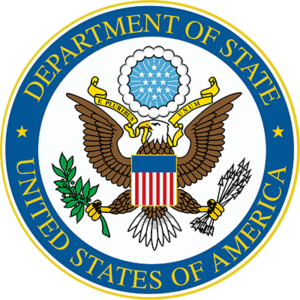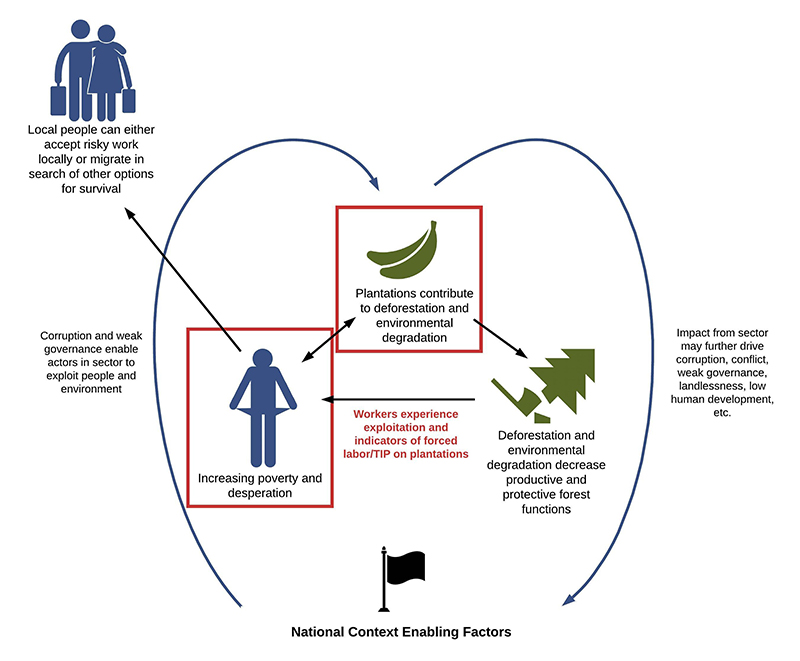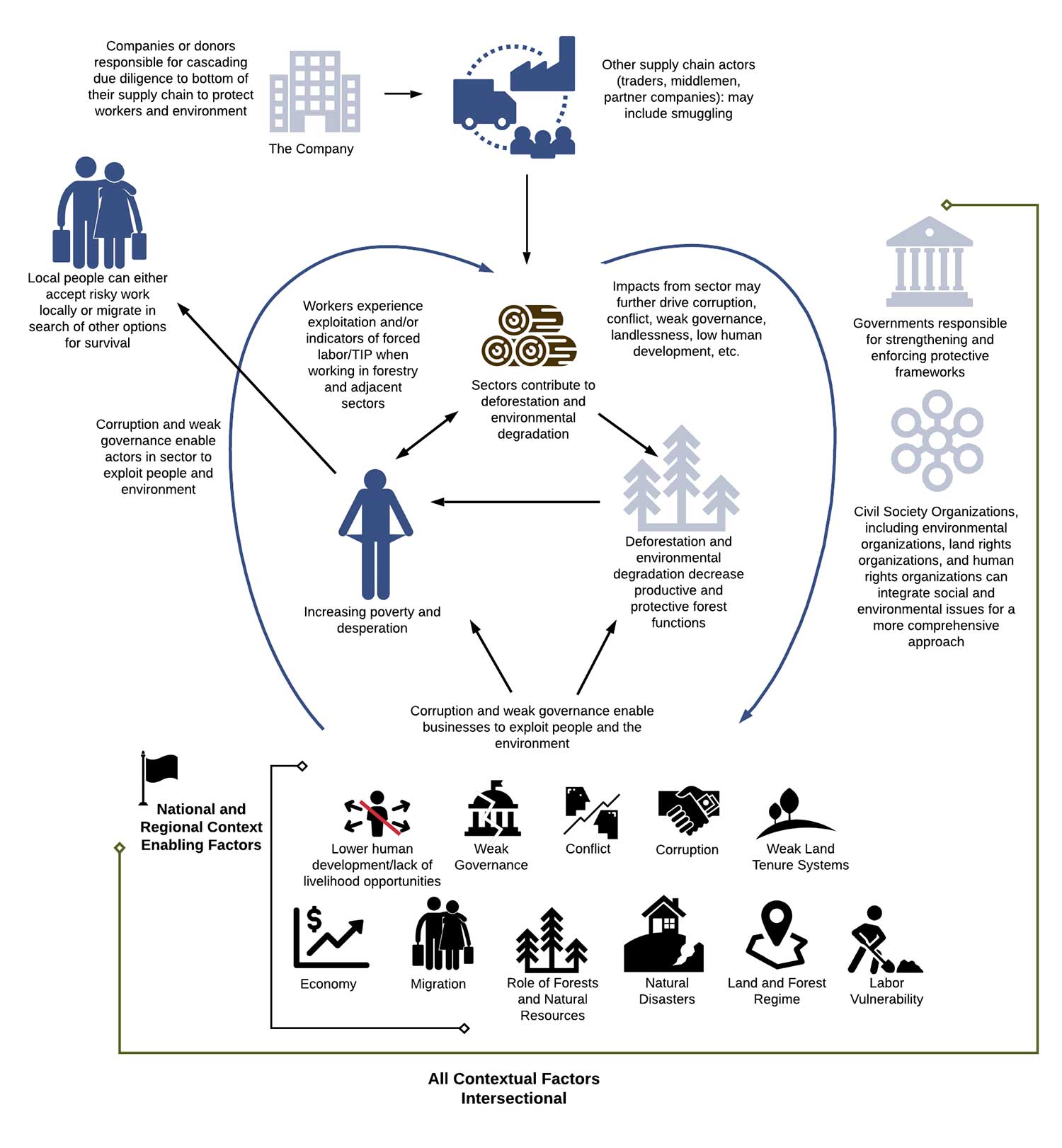Verité Reports on Forestry
Exploring Intersections of Trafficking in Persons Vulnerability and Environmental Degradation in Forestry and Adjacent Sectors: Case Studies in Burma and Mozambique
Reports & Webinars
PDF of Presentation >
PDF of Presentation >
Forests and forested areas are vital for human development and wellbeing, yet they are disappearing at a rapid and alarming rate. Previous research has begun to document the ways in which environmental degradation tied to deforestation can worsen poverty and insecurity and push people into exploitative labor conditions, including trafficking in persons, but the nature and mechanisms of the connection has yet to be fully clarified.
With support from the U.S. State Department’s Office to Monitor and Combat Trafficking in Persons (J/TIP), Verité conducted exploratory research to contribute to this knowledge gap through a set of case studies in different geographic locations, sectors, and contexts. Findings from this research document the root causes of labor risk associated with deforestation in each case and the steps that companies, governments, and other stakeholders can take to reduce labor exploitation and environmental degradation.
For more information, contact Max Travers at mtravers@verite.org.
Capstone Report
This summary report describes the overall methodology used to conduct the research and proposes an analytic framework for other practitioners in the field to examine the relationships between deforestation and vulnerability to trafficking in persons. A thematic approach to understanding these intersections is presented, and each theme is elaborated by drawing on examples of findings from country case studies and linkages between environmental degradation and trafficking in persons vulnerability, as well as related phenomenon documented in the existing literature. Read the Capstone Report >
Burma
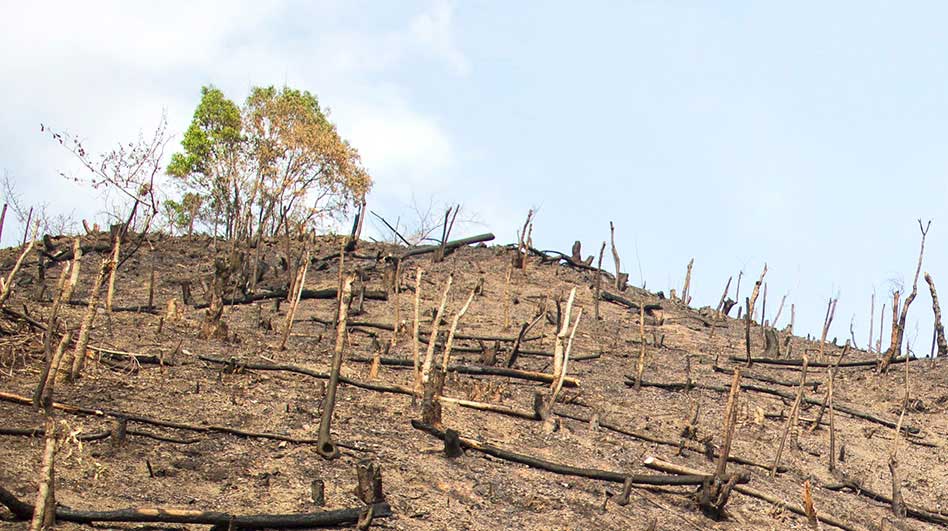
Research in Burma focused on two sectors linked to deforestation: large scale agribusiness and informal small-scale logging. A case study on banana plantations in Kachin State looked at pathways into work on the plantations for both local and internal migrant workers and associated labor exploitation. A second case study on small-scale logging in northern Burma examined the nature of informality in the sector, worker demographics, working conditions, and potential links to more formal supply chains. Read the summary report >
The Banana Plantations in Kachin State case study focuses on a sector which is creating vulnerability for local communities due to associated land grabbing, deforestation, and the unregulated use of pesticides. This has led to severe impacts on community health from pesticide use as well as effects on livelihoods. A variety of exploitative working conditions were also present among workers, some of which amounted to forced labor indicators. Violations of Burma labor laws related to employment contracts, occupational safety and health (OSH), minimum wage, hours of work, and paid time off were also detected, as well as evidence of worst forms of child labor. Read the case study >
Assessment of Working Conditions and Indicators of Trafficking in Persons and Forced Labor Risk on Banana Plantations (click to enlarge)
The Informal Small-Scale Logging case study focuses on assessing labor conditions in small-scale informal logging occurring in Sagaing Region, Shan State, and Kachin State. In this sector, workers are driven to logging by a variety of economic factors including a lack of viable livelihood options, which, in part, contribute to environmental degradation and associated impacts. These factor limit the ability of surrounding communities to access forest products and benefit from the protective functions of the forests. The research identified a number of serious labor rights abuses, including work conducted by children under 18 which amounts to the worst forms of child labor. Read the case study >
Mozambique
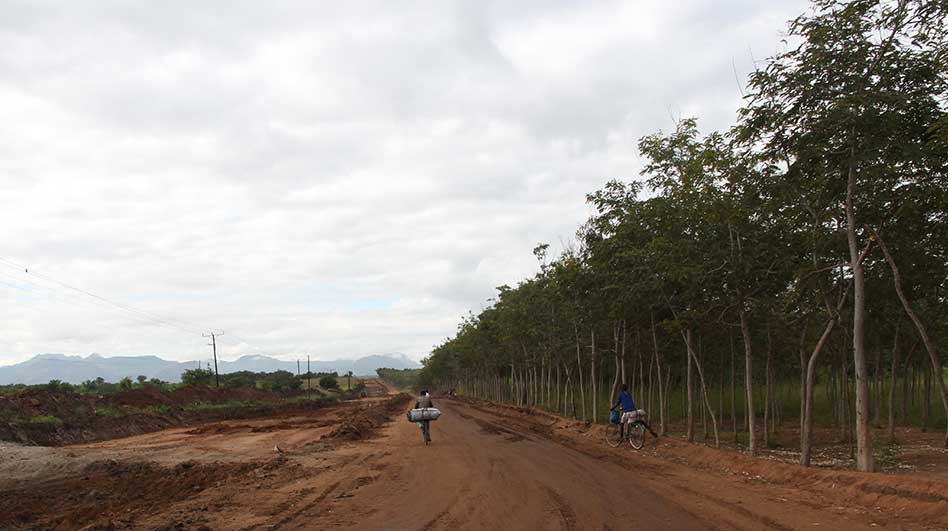
Research in Mozambique focused on two different sectors linked to deforestation: illicit logging in Tete Province and road construction in Niassa Province. Read the summary report >
The Tete Province case study on illicit logging of Pterocarpus Tinctorius provides an example of how weaknesses in enforcement of forestry projection regimes have enabled a range of activities that underpin both labor rights abuses and deforestation. These activities include abuse of permits and concession licenses, bribery, operating without management plans, under-reporting export volume, smuggling raw logs, and harvesting and transporting undesignated species of trees. Some evidence of trafficking in persons vulnerability was also detected. Read the case study >
Mapping of Dynamics Associated with Deforestation, Environmental Degradation, and Vulnerability to Trafficking in Persons (click to enlarge)
The Niassa Province case study on construction of the Cuamba–Mandimba–Lichinga section of the N13 road provides an example of a complex network of global and local public and private institutions funding and facilitating a project that contributes to deforestation while having negative social and labor outcomes for workers involved. Despite donor measures intended to provide both environmental and social protections for workers and surrounding communities, research found evidence of a number of indicators of trafficking in persons in the sector in the form of deception about the nature and conditions of work (primarily wage levels, hours, and job tasks); work for very low wages; and abuse and harassment, as well as evidence of violation of a range of social and labor protection standards. Read the case study >
These reports were made possible through the generous support of the United States Department of State’s Office to Monitor and Combat Trafficking in Persons (J/TIP). The opinions expressed herein are those of the author(s) and do not necessarily reflect the views of the United States Department of State.
